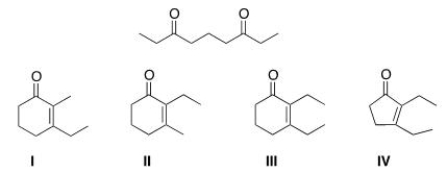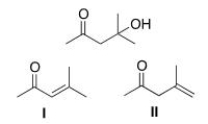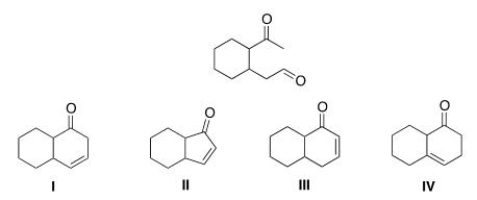Exam 24: Carbonyl Condensation Reactions
Exam 1: Structure and Bonding69 Questions
Exam 2: Acids and Bases52 Questions
Exam 3: Introduction to Organic Molecules and Functional Groups45 Questions
Exam 4: Alkanes57 Questions
Exam 5: Stereochemistry59 Questions
Exam 6: Understanding Organic Reactions45 Questions
Exam 7: Alkyl Halides and Nucleophilic Substitution61 Questions
Exam 8: Alkyl Halides and Elimination Reactions43 Questions
Exam 9: Alcohols, Ethers, and Related Compounds49 Questions
Exam 10: Alkenes43 Questions
Exam 11: Alkynes42 Questions
Exam 12: Oxidation and Reduction39 Questions
Exam 13: Mass Spectrometry and Infrared Spectroscopy35 Questions
Exam 14: Nuclear Magnetic Resonance Spectroscopy29 Questions
Exam 15: Radical Reactions42 Questions
Exam 16: Conjugation, Resonance, and Dienes43 Questions
Exam 17: Benzene and Aromatic Compounds31 Questions
Exam 18: Reactions of Aromatic Compounds54 Questions
Exam 19: Carboxylic Acids and the Acidity of the O-H Bond36 Questions
Exam 20: Introduction to Carbonyl Chemistry;29 Questions
Exam 21: Aldehydes and Ketones Nucleophilic Addition42 Questions
Exam 22: Carboxylic Acids and Derivatives46 Questions
Exam 23: Substitution Reactions of Carbonyl Compounds at the Alpha-Carbon40 Questions
Exam 24: Carbonyl Condensation Reactions45 Questions
Exam 25: Amines53 Questions
Exam 26: Carbon-Carbon Bond Forming Reactions in Organic Synthesis37 Questions
Exam 27: Pericyclic Reactions47 Questions
Exam 28: Carbohydrates38 Questions
Exam 29: Amino Acids and Proteins35 Questions
Exam 30: Synthetic Polymers36 Questions
Exam 31: Lipids39 Questions
Select questions type
Under basic conditions, the Aldol reaction is reversible, but dehydration is not.What is the reason for this difference in reactivity?
Free
(Multiple Choice)
4.8/5  (39)
(39)
Correct Answer:
A
Would this crossed Aldol reaction work well? Why or why not?

Free
(Multiple Choice)
4.7/5  (31)
(31)
Correct Answer:
A
What is the Aldol addition product formed from the reaction of acetone, (CH3)2CO, with itself?

Free
(Multiple Choice)
4.9/5  (40)
(40)
Correct Answer:
A
What is the Aldol addition product formed from reaction of the following compound with itself?

(Multiple Choice)
4.8/5  (34)
(34)
The b-hydroxy carbonyl product of an Aldol reaction is oftentimes not the final isolated product; what is the explanation for this result?
(Multiple Choice)
4.9/5  (44)
(44)
The following reaction is an example of what type of reaction?

(Multiple Choice)
4.9/5  (37)
(37)
What cyclic product is formed in the intramolecular Aldol condensation when the following compound is treated with aqueous NaOH?

(Multiple Choice)
4.7/5  (34)
(34)
What is the general name for the class of products formed in an Aldol condensation reaction?
(Multiple Choice)
4.8/5  (40)
(40)
Which of the following bicyclic ring systems can be prepared by an intermolecular Robinson annulation?

(Multiple Choice)
4.9/5  (37)
(37)
There are several variations of the Aldol reaction.Which of the following types of reactants leads to only one possible product with the Aldol condensation reaction?
(Multiple Choice)
4.7/5  (39)
(39)
Of the carbonyl compounds; (1) benzaldehyde, (2) acetophenone and (3) dicyclohexyl ketone, which compound has noa-hydrogens?
(Multiple Choice)
4.9/5  (36)
(36)
In the correct order, what are the three steps in the mechanism of an Aldol reaction?
(Multiple Choice)
4.8/5  (36)
(36)
Which is the unsaturated carbonyl compound formed in the dehydration of the following b-hydroxy carbonyl compound?

(Multiple Choice)
4.7/5  (33)
(33)
What is the cyclic product formed in the intramolecular Aldol condensation when the following compound is treated with aqueous NaOH?

(Multiple Choice)
4.8/5  (37)
(37)
Why is the Aldol reaction often called an Aldol condensation?
(Multiple Choice)
4.8/5  (39)
(39)
When is a crossed Aldol reaction said to be synthetically useful?
(Multiple Choice)
4.9/5  (37)
(37)
When is a crossed Claisen reaction between two different esters synthetically useful?
(Multiple Choice)
4.8/5  (30)
(30)
Complete this statement: A major difference between the Aldol condensation and the Claisen condensation reactions is that
(Multiple Choice)
4.8/5  (30)
(30)
Which of the following statements about Aldol reactions with either aldehydes or ketones is true?
(Multiple Choice)
4.9/5  (28)
(28)
Showing 1 - 20 of 45
Filters
- Essay(0)
- Multiple Choice(0)
- Short Answer(0)
- True False(0)
- Matching(0)